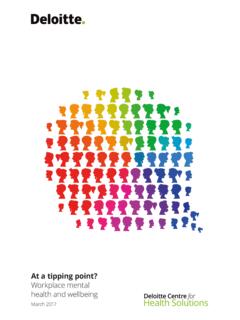Transcription of MENTAL HEALTH INFORMATION SYSTEMS
1 MENTAL HEALTH Policy and Service Guidance Package MENTAL HEALTH . INFORMATION . SYSTEMS . A MENTAL HEALTH INFORMATION system is a system for action: it should exist not simply for the purpose of gathering data, but also for enabling well-informed decision-making ISBN 92 4 154671 9 in all aspects of the MENTAL HEALTH system .. world HEALTH organization MENTAL HEALTH Policy and Service Guidance Package MENTAL HEALTH . INFORMATION . SYSTEMS . world HEALTH organization WHO Library Cataloguing-in-Publication Data world HEALTH organization . MENTAL HEALTH INFORMATION SYSTEMS . ( MENTAL HEALTH Policy and Service Guidance Package). 1. MENTAL HEALTH services 2. INFORMATION SYSTEMS organization and administration 3. Guidelines I. Title II. Series ISBN 92 4 154671 9.
2 (NLM classification: WM 30). INFORMATION concerning this publication can be obtained from: Dr Michelle Funk MENTAL HEALTH Policy and Service Development Team Department of MENTAL HEALTH and Substance Abuse Noncommunicable Diseases and MENTAL HEALTH Cluster world HEALTH organization CH-1211, Geneva 27. Switzerland Tel: +41 22 791 3855. Fax: +41 22 791 4160. E-mail: world HEALTH organization 2005. All rights reserved. Publications of the world HEALTH organization can be obtained from WHO Press, world HEALTH organization , 20 Avenue Appia, 1211 Geneva 27, Switzerland (tel: +41 22 791 2476; fax: +41 22 791 4857; email: Requests for permission to reproduce or translate WHO. publications whether for sale or for noncommercial distribution should be addressed to WHO Press, at the above address (fax: +41 22 791 4806; email: The designations employed and the presentation of the material in this publication do not imply the expression of any opinion whatsoever on the part of the world HEALTH organization concerning the legal status of any country, territory, city or area or of its authorities, or concerning the delimitation of its fron- tiers or boundaries.))
3 Dotted lines on maps represent approximate border lines for which there may not yet be full agreement. The mention of specific companies or of certain manufacturers' products does not imply that they are endorsed or recommended by the world HEALTH organization in preference to others of a similar nature that are not mentioned. Errors and omissions excepted, the names of proprietary products are distin- guished by initial capital letters. All reasonable precautions have been taken by the world HEALTH organization to verify the INFORMATION contained in this publication. However, the published material is being distributed without warranty of any kind, either express or implied. The responsibility for the interpretation and use of the material lies with the reader.
4 In no event shall the world HEALTH organization be liable for damages arising from its use. Printed in China iiii Acknowledgements The MENTAL HEALTH Policy and Service Guidance Package was produced under the direction of Dr Michelle Funk, Coordinator, MENTAL HEALTH Policy and Service Development, and supervised by Dr Benedetto Saraceno, Director, Department of MENTAL HEALTH and Substance Abuse, world HEALTH organization . The world HEALTH organization gratefully acknowledges the work of Dr Crick Lund, Department of Psychiatry and MENTAL HEALTH , University of Cape Town, South Africa, and Dr Tennyson Lee, Institute of Psychiatry, London, United Kingdom, in preparing this module. Editorial and technical coordination group: Dr Michelle Funk, world HEALTH organization , Headquarters (WHO/HQ), Ms Natalie Drew (WHO/HQ), Dr Benedetto Saraceno (WHO/HQ), Dr Margaret Grigg (WHO/HQ) and Dr Steve Sapirie, Director INFORM, Management Sciences for HEALTH , Boston, MA, United States of America.
5 Technical assistance: Dr Th r se Agossou, WHO Regional Office for Africa (AFRO), Mr Mark van Ommeren (WHO/HQ), Dr Tom Barrett, (WHO/HQ), Dr Jos Miguel Caldas de Almeida, WHO. Regional Office for the Americas (AMRO), Dr Antonio Lora, HEALTH Authority Region of Lombardy, Milan Italy, Dr Matt Muijen, WHO Regional Office for Europe (EURO), Dr S. Murthy, WHO Regional Office for the Eastern Mediterranean (EMRO), Dr Vijay Chandra, WHO Regional Office for South-East Asia (SEARO), Dr WANG. Xiangdong, WHO Regional Office for the Western Pacific (WPRO) and Dr Shekhar Saxena (WHO/HQ). Administrative support: Ms Adeline Loo (WHO/HQ), Mrs Anne Yamada (WHO/HQ) and Mrs Razia Yaseen (WHO/HQ). Layout and graphic design: 2S ) graphicdesign Editor: Praveen Bhalla iii WHO also wishes to thank the following people for their expert opinion and technical input to this module: Dr J.
6 Arboleda-Florez Professor and Head, Department of Psychiatry, Queen's University, Kingston, Ontario, Canada Ms Basia Arnold Principal Technical Specialist, MENTAL HEALTH Directorate, Ministry of HEALTH , New Zealand Dr Joseph Bediako Asare Chief Psychiatrist, Accra Psychiatric Hospital, Accra, Ghana Mr David Bertollo Nathan S. Kline, Institute for Psychiatric Research, Orangeburg, NY, USA. Dr CHUEH Chang Associate Professional and Researcher, National Taiwan University, Taiwan (China). Professor Alan Flisher University of Cape Town, Observatory, South Africa Ms Phillipa Gaines Manager, MENTAL HEALTH system Development, MENTAL HEALTH Directorate, Ministry of HEALTH , Wellington, New Zealand Dr HE, Yanling Shanghai MENTAL HEALTH Center, Shanghai, China Dr HWANG Tae-Yeon Director, Department of Psychiatric Rehabilitation and Community MENTAL HEALTH , WHO Collaborating Centre, Yongin MENTAL Hospital, Yongin City, Kyonggi Province, Republic of Korea Dr Stan Kutcher Associate Dean, Clinical Research Centre, Dalhousie University, Halifax, Nova Scotia, Canada Dr Pirkko Lahti Executive Director, Finnish Association for MENTAL HEALTH , Helsinki, Finland Dr Eugene M.
7 Laska Director, WHO Collaborating Centre, Nathan S. Kline, Institute for Psychiatric Research, Orangeburg, NY, USA. Dr John Mayeya MENTAL HEALTH Specialist, Central Board of HEALTH , Lusaka, Zambia Dr Graham Mellsop Head, South Auckland Clinical School, University of Auckland, Auckland, New Zealand Ms Precious Modiba Manager, HEALTH and Vital Statistics, Statistics SA, Pretoria, South Africa Dr Malcolm Philip Sainsbury Centre for MENTAL HEALTH , London, United Kingdom Dr Jane Pirkis Centre for HEALTH Programme Evaluation, Victoria, Australia Ms Mirja Sev n Secretary for International Affairs, The Finnish Association for MENTAL HEALTH , Helsinki, Finland Dr Carole Sigel Nathan S. Kline Institute for Psychiatric Research Orangeburg, NY, USA.
8 Dr Zebulon Taintor President, world Association for Psychosocial Rehabilitation (WAPR), Department of Psychiatry, New York University Medical Center, New York, NY, USA. Dr Rita Thom Faculty of HEALTH Sciences, University of the Witwatersrand, South Africa Dr ZOU Yizhuang Vice Director, Beijing Hui Long Guan Hospital, Beijing, China WHO also wishes to acknowledge the generous financial support of the Governments of Italy, the Netherlands and New Zealand, as well as the Eli Lilly and Company Foundation and the Johnson and Johnson Corporate Social Responsibility, Europe. iv A MENTAL HEALTH INFORMATION system is a system for action: it should exist not simply for the purpose of gathering data, but also for enabling well-informed decision-making in all aspects of the MENTAL HEALTH system .
9 V Table of Contents Preface viii Executive summary 2. Aims and target audience 11. 1. Introduction 13. What is a MENTAL HEALTH INFORMATION system ? 13. What are the main stages of an MHIS? 13. From where should INFORMATION be collected? 15. What types of INFORMATION should be collected? 16. Benefits of an MHIS 19. Common problems with HEALTH INFORMATION SYSTEMS 20. 2. Principles of MHIS development 23. Start small, but keep the big picture in view 23. Use indicators 24. Establish a minimum data set 25. Make the MHIS user-friendly 26. Clarify the relationship of the MHIS with INFORMATION SYSTEMS in the general HEALTH and other sectors 26. Consult with all stakeholders 28. Link MHIS development to wider service development 31. Consider routine and non-routine data 31.
10 Consider how epidemiological data should be included in the MHIS 32. Ensure privacy, confidentiality, access to INFORMATION and consent 33. Address specific MENTAL HEALTH INFORMATION needs 33. 3. Steps in designing and implementing a MENTAL HEALTH INFORMATION system 35. Step 1. Needs assessment: what INFORMATION do we need? 36. Task 1: Establish a task team 36. Task 2: Review current policy and planning objectives 37. Task 3: Consult with all relevant stakeholders 38. Task 4: Identify indicators for measuring the policy and planning objectives 40. Step 2. Situation analysis: what INFORMATION do we have? 47. Task 1: Review the current situation 47. Task 2: Conduct a walk-through analysis 50. Step 3. Implementation: how can we get the INFORMATION we need?













